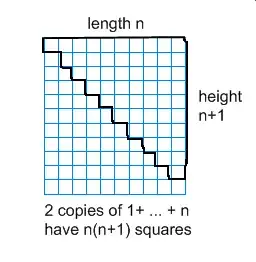Method 1: (requires you to consider whether $n$ is odd or even.)
$S = 1 + 2 + ...... + n$.
Join up the first to term to the last term and second to second to last and so on.
$S = \underbrace{1 + \underbrace{2 + \underbrace{3 +....+(n-2)} + (n-1)} + n}$.
$= (n+1) + (n+1) + .....$.
If $n$ is even then:
$S = \underbrace{1 + \underbrace{2 + \underbrace{3 +..+\underbrace{\frac n2 + (\frac n2 + 1)}+..+(n-2)} + (n-1)} + n}$
And you have $\frac n2$ pairs that add up to $n+1$. So the sum is $S= \frac n2(n+1)$.
If $n$ is odd then:
$S = \underbrace{1 + \underbrace{2 + \underbrace{3 +..+\underbrace{\frac {n-1}2 + [\frac {n+1}2] + (\frac {n+1}2 + 1)}+..+(n-2)} + (n-1)} + n}$
And you have $\frac {n-1}2$ pairs that also add up to $n+1$ and one extra number $\frac {n+1}2$ which didn't fit into any pair. So the sum is $\frac {n-1}2(n+1) + \frac {n+1}2 =(n-1)\frac {n+1}2 + \frac {n+1}2 = (n-1 + 1)\frac {n+1}2n=n\frac {n+1}2$.
Method 1$\frac 12$ (Same as above but waves hands over doing tso cases).
$S = average*\text{number of terms} = average*n$.
Now the average of $1$ and $n$ is $\frac {n+1}2$ and the average of $2$ and $n-1$ is $\frac {n+1}2$ and so on. So the average of all of them together is $\frac {n+1}2$. So $S = \frac {n+1}2n$.
Method 2: (doesn't require considering whether $n$ is odd or even).
$S = 1 + 2 + 3 + ...... + n$
$S = n + (n-1) + (n-2) + ...... + 1$.
$2S = S+S = (n+ 1) + (n+1) + ..... + (n+1) = n(n+1)$>
$S = \frac {n(n+1)}2$.
Note that by adding $S$ to itself this doesn't matter whether $n$ is even or odd.
And lest you are wondering why can we be so sure that $n(n+1)$ must be even (we constructed it so it must be true... but why?) we simply note that one of $n$ or $n+1$ must be even.
So no problem.
